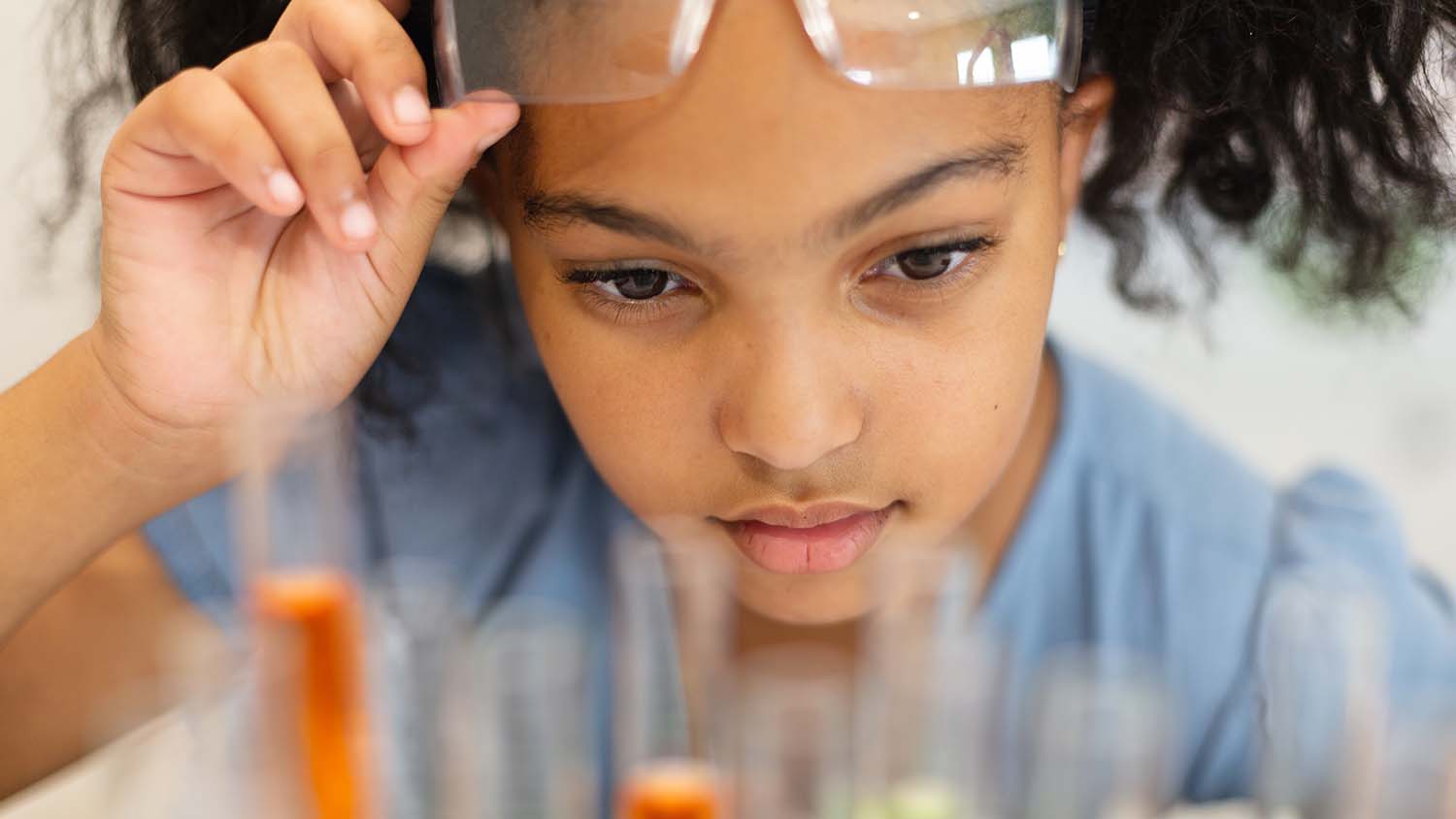
IES widely supports and disseminates high-quality research focusing on science, technology, engineering, and mathematics (STEM) through NCER and NCSER. To celebrate National STEM Day on November 8 and every day, we highlight some of the work that NCER and NCSER have supported over the years in the various STEM areas, as well as opportunities for funding future work. Additional information about IES’s investment in STEM education can also be found on our STEM topic page.
Science
- Researchers developed ChemVLab+ an online chemistry intervention that allows high school students to perform experiments and analyze data in a flexible, multimedia virtual chemistry lab environment. The online modules promote conceptual understanding and science inquiry skills aligned to the Next Generation Science Standards. The chemistry activities are freely available on the project website.
- Researchers are developing Words as Tools, an intervention for emergent bilingual adolescents that is designed for use in English as a second language classes to promote development of metalinguistic awareness with science vocabulary. The lessons, being developed with a lens of culturally sustaining pedagogy, are intended to help build knowledge of essential science words as well as how words work in science.
- Researchers are evaluating the efficacy of an integrated science and literacy curriculum (ISLC) designed to engage first grade students in scientific investigations at a level appropriate for young learners. ISLC addresses the challenges of language and literacy development by ensuring that the language of science is brought forward and explicitly addressed in an integrated approach.
- Through Project MELVA-S, researchers are developing an online formative assessment that measures the science vocabulary knowledge of Latinx bilingual students with different levels of English and Spanish language proficiencies. Results from the assessment can be used to monitor the progress of individual students, help teachers differentiate language and vocabulary instruction, and provide additional science vocabulary supports.
Technology
- Using The Foos by codeSpark, researchers are exploring computational thinking processes in grades 1 and 3 through a series of classroom-based studies.
- Researchers are evaluating the efficacy of the CAL-KIBO curriculum, an educational robotics program designed for use with early elementary school-aged students to examine its impact on computational thinking, fluid reasoning, and math achievement.
- Researchers are systematically investigating how specific features of immersive virtual reality (IVR) can be used to improve student outcomes in science learning. In particular, the researchers are exploring how visual and auditory IVR design features can enhance affective state and cognitive processing in general and for specific subgroups of learners.
- Researchers are developing and testing TaylorAI, an artificial intelligence formative feedback and assessment system for hands-on science investigations to help build student competence as they engage in laboratory activities.
- In partnership with the National Science Foundation, IES is co-funding two National Artificial Intelligence (AI) Institutes. Under NCER, the Institute for Inclusive and Intelligent Technologies for Education (INVITE) is developing artificial intelligence (AI) tools and approaches to support behavioral and affective skills (for example, persistence, academic resilience, and collaboration) to improve learning in STEM education. Under NCSER, the AI Institute for Exceptional Education (AI4ExceptionalEd) is using multiple cutting-edge AI methodologies to create the technology to assist speech-language pathologists with identifying students in need of speech and language services and delivering individualized interventions.
Engineering
- Researchers are developing an innovative teacher professional learning intervention called Elevating Engineering with Multilingual Learners that is intended to help grade 3-5 teachers develop the knowledge and skills they need to effectively teach engineering to English learners and all students through culturally and linguistically responsive pedagogies and engineering instruction.
- Product developers and researchers are developing and testing NEWTON-AR, an augmented reality (AR) application-based engineering, computer science, and STEM puzzle game for children in kindergarten to grade 3. Intended for use in classrooms, after-school programs, and at home, NEWTON-AR will combine AR, engineering, simulation, making, and programming into a sandbox game where students create, modify, simulate, prototype, and test contraptions to solve puzzle challenges.
Mathematics
- Researchers have developed and tested for efficacy of Fusion, a first-grade intervention aimed at developing understanding of whole numbers for students at risk for mathematics learning disabilities. It is designed as a program for schools using a multi-tiered approach to instruction that provides increasingly intense levels of instruction based on the results of frequent progress monitoring of students.
- Researchers tested for efficacy of Pirate Math Equation Quest, a word problem-solving intervention for third grade students with mathematics difficulties, including students with or at risk for mathematics learning disabilities.
- Researchers assessed the efficacy of Interleaved mathematics practice, an intervention that rearranges math practice problems so that 1) different kinds of math problems are mixed together, which improves learning, and 2) problems of the same kind are distributed across multiple assignments, which improves retention. A new systematic replication study is also now underway to further examine the efficacy of interleaved mathematics practice.
- Researchers have conducted several impact studies (one conducted with grade 7 students in Maine and replication study conducted in North Carolina) of ASSISTments, a free web-based program that provides immediate feedback to students and teachers on homework. ASSISTments can be used with any commercial or locally developed math curriculum, and teachers can assign "mastery" problem sets that organize practice to facilitate the achievement of proficiency.
STEM Education Research Funding Opportunities
Research grant funding opportunities focusing on STEM education can be found across several programs and competitions. Currently, there are several active funding opportunities where training or research with a STEM education focus would fit:
More information on these fundings opportunities can also be found at: https://ies.ed.gov/funding/
This blog was written by Sarah Brasiel (sarah.brasiel@ed.gov), program officer at NCSER and Christina Chhin (christina.chhin@ed.gov), program officer at NCER.